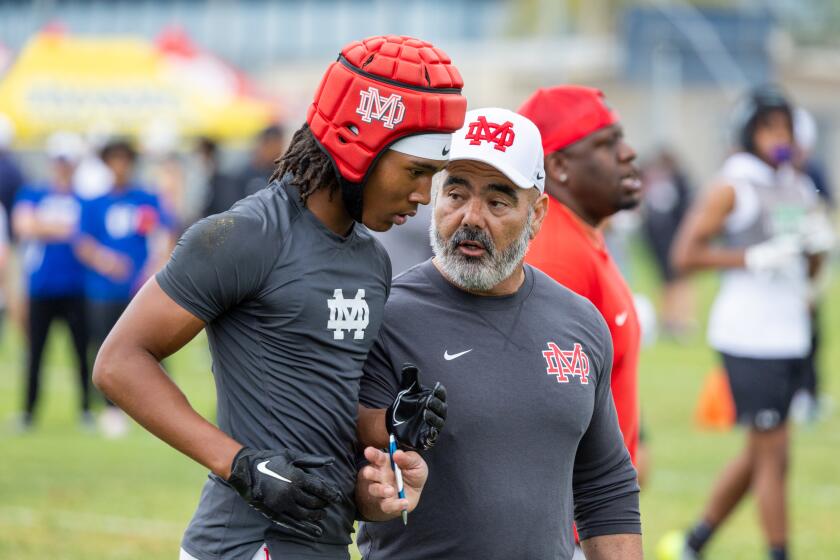Manual Arts Drops Teams -- and Ball
There is no acceptable reason for a high school with more than 3,700 students to drop four sports teams in the same semester.
That’s the dubious distinction achieved by Los Angeles Manual Arts this spring.
In March, the boys’ tennis team was dropped because of lack of interest. The boys’ volleyball team never made it on the court because of an administrative foul-up. And this month, the varsity and junior varsity baseball teams had to forfeit their last five league games because 17 of 23 players were declared academically ineligible.
Administrators and coaches at Manual Arts failed in their responsibility to create a positive environment for students to train and learn.
“It’s embarrassing,” Principal Ed Robillard said.
The City Section rules committee, in its meeting today, is expected to request Manual Arts administrators to attend next month’s meeting and explain what’s being done to correct the problems.
The baseball team’s demise is most troubling. While the ineligible players have only themselves to blame, why hasn’t the program taken advantage of free tutoring opportunities available through Major League Baseball’s Reviving Baseball in Inner Cities?
John Young, the founder of RBI, said Manual Arts doesn’t participate in RBI-sponsored summer leagues or the tutoring program. “It’s very disappointing,” he said.
Robillard said he has begun to focus on making changes in the athletic program.
“We’re certainly not proud of what happened,” he said. “We’re taking steps through the whole athletic program to try to reinvigorate things.”
There’s much blame to go around, but what’s important is preventing a similar debacle next season.
*
Most baseball coaches would prefer to avoid playing wild-card games because it puts a strain on their pitching staffs. But those teams that survive and then triumph in the first round have already demonstrated they have the necessary pitching depth to be champions.
In Division I, Glendora and Anaheim Esperanza pulled out playoffs victories last week. In Division II, Simi Valley, Placentia El Dorado and Newhall Hart did the same. All five upset league champions in the first round.
Among the impressive pitching performances, Hart’s Tyler Fick struck out 10 in 3 2/3 innings of no-hit relief against Murrieta Valley. El Dorado’s Zach Pettikas threw a one-hit shutout to defeat Whittier. Simi Valley’s Dylan Gaughen struck out nine consecutive batters in relief against Atascadero.
Notably, Fick and Pettikas are left-handers.
“If you throw strikes and you’re left-handed, you have a good chance to win,” Hart Coach Jim Ozella said.
El Dorado (19-9) is a dangerous team in Division II. Five of its nine losses were to Century League powers Villa Park and Anaheim Canyon. And the Hawks are a much better team since the April promotion of freshman center fielder Matt Flaig, who’s batting .370 and is the younger brother of former El Dorado standout Jeff Flaig.
“The main thing is he’s not afraid,” Coach Steve Gullotti said.
El Dorado also has an improving junior third baseman in Shaun Lane.
“Everyone is clicking right now,” Lane said.
*
Mark down the name of Brett Hambright of Lake Elsinore Temecula Valley as one of the top freshmen baseball players this season. In two Division II playoff games, Hambright threw 10 innings of scoreless relief. He also had two hits against top-seeded Villa Park in a 3-2, 16-inning defeat.
*
John Jackson is an assistant junior varsity baseball coach at Woodland Hills El Camino Real. He’s also an actor who plays the role of Admiral Chegwidden on the CBS drama “JAG.” In last week’s final episode, Chegwidden announced he’s retiring from the Navy so he can visit every ballpark in the major leagues with his daughter.
The TV writers weren’t far off. Jackson’s son, Conor, is among the top Arizona Diamondback prospects.
*
The NCAA has approved two recruiting rules that will expedite the recruiting process of high school athletes.
Beginning next March, colleges can make phone calls to junior prospects in all sports outside of football. And in April, colleges can have contact with junior prospects at their high schools. The rule already has been in effect for boys’ basketball.
The new rules will increase pressure on top junior prospects to make their college decisions earlier than ever.
Eric Sondheimer can be reached at eric.sondheimer@latimes.com.
Get our high school sports newsletter
Prep Rally is devoted to the SoCal high school sports experience, bringing you scores, stories and a behind-the-scenes look at what makes prep sports so popular.
You may occasionally receive promotional content from the Los Angeles Times.




